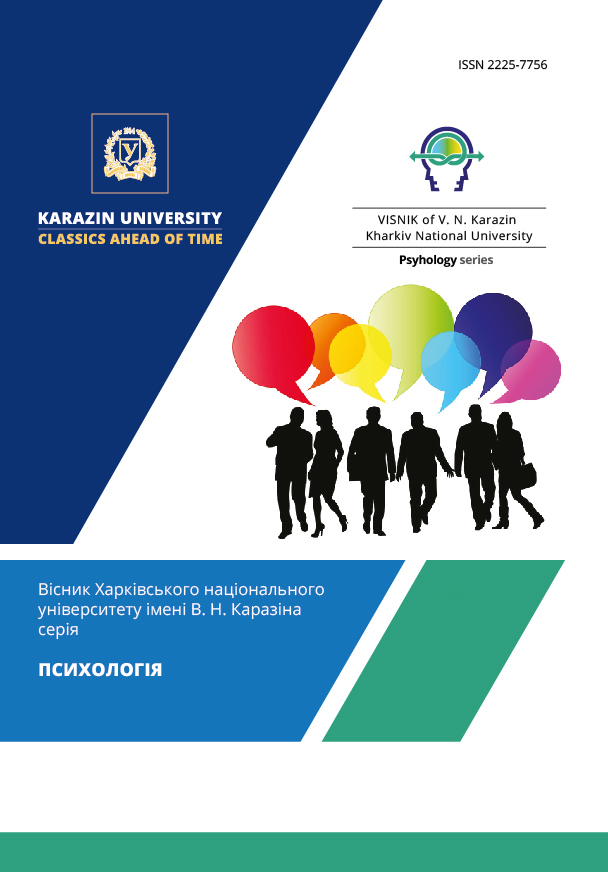Subjective Economic Well-Being of Entrepreneurs During the War in Ukraine
Abstract
The purpose of the work is to determine the characteristics of the subjective economic well-being of entrepreneurs during the war in Ukraine. Ukrainian entrepreneurs have been working in conditions of full-scale war for more than two years. A catastrophic situation of uncertainty hinders the conduct of business, but despite this, specialists determine an increase in economic activity. Entrepreneurs working in Ukraine (N=50), aged 23 to 55, were involved in the study. The experience of entrepreneurial activity ranged from 7 to 22 years. Areas of business activity: trade, sale and lease of real estate, agronomy, construction, freight transportation, furniture production. Questionnaires, the method of incomplete sentences (modified by us), the questionnaire of subjective economic well-being (V.A. Khashchenko) and the methods of mathematical statistics were chosen as research methods. It was determined that the subjective economic well-being of the studied entrepreneurs has a moderate level of expressiveness. At the same time, there is a noticeable tendency for men to grow in negative experiences caused by a lack of finances. And for women, a positive assessment of the current well-being of the family is characteristic. It should also be said that women entrepreneurs, compared to men, experience significantly higher economic optimism, current family well-being, and overall economic well-being. Economic optimism is higher among entrepreneurs with higher education than among those with only secondary education. Not married entrepreneurs evaluate the current well-being of their own family more positively than married ones; but no differences were found in the level of subjective economic well-being depending on the presence of children, as well as depending on objective indicators and their subjective assessment by entrepreneurs of the amount of financial profit.
Downloads
References
Гнускіна Г. В. Професійне вигорання у підприємців: зв’язок між рівнем вираженості та чинниками мезорівня. Актуальні проблеми психології. 2014. Т. 1, Вип. 41. С. 122–125. http://nbuv.gov.ua/UJRN/appsuh_2014_ 1_41_25.
Горбаль І.С. Соціально-психологічні чинники суб’єктивного благополуччя пенсіонерів : автореф. дис. ... канд. психол. наук : 19.00.05 ; Ін-т соціальної та політичної психології НАПН України Київ, 2016. 20 с. https://ispp.org.ua/2020/05/05/socialno-psixologichni-chinniki-subyektivnogo-blagopoluchchya-pensioneriv/
Дядін А.С. Дефініція категорії «підприємницька діяльність». Економічна стратегія і перспективи розвитку сфери торгівлі та послуг. 2017. Вип. 1 (25). С. 62–72. URL:http://elib.hduht.edu.ua/bitstream/123456789/1808/1/%
Карамушка Л.М., Худякова Н.Ю. Мотивація підприємницької діяльності : монографія. Київ—Львів : Сполом, 2011. 208 с. https://www.academia.edu/51137691/%D0%9A%D0%B0%D1%80%D0%
Красилова Ю.В. Психологічні чинники підприємницької активності особистості : автореф. дис.… канд. психол. наук : 19.00.01 / Київський національний університет імені Тараса Шевченка. Київ, 2004. 16 с.
Максименко С.Д., Карамушка Л.М., Креденцер О.В., Івкін В.М. Еconomic psychology in Ukraine: challenges, trends, prospects. Організаційна психологія. Економічна психологія. 2015. № 3. C. 7-15. https://lib.iitta.gov.ua/id/eprint/704495/1/Maksymenko3.pdf
Пилипенко В., Шевель І. Соціологія підприємництва. Київ : Стилос, 1997. 104 с.
Hashchenko, V.A. (2005). A model of subjective economic well-being. Психологический журнал. 2005. Т. 26. № 3. С. 38-50.
Чернявська Т.П. Особистість у бізнесі: навч.-метод. посіб. Донецьк : Донбас, 2013. 40 с.
Швалб Ю.М., Данчева О.В. Практична психологія в економіці і бізнесі. К.: Лібра. 1998.
Яновська С.Г. Соціально-економічні та психологічні ознаки підприємництва. Проблеми сучасної психології Кам'янець-Подільського національного університету імені Івана Огієнка, Інституту психології імені Г.С. Костюка НАПН України. 2013. Вип. 21. C. 799–809. https://doi.org/10.32626/2227-6246.2013-21
Frijters P., Haisken-DeNew J.P., Shields M.A. money does matter! Evidence from increasing real income and life satisfaction in East Germany following reunification. American Economic review. 2004. V. 94. P. 730–740.
Hsee C.K., Yang Y., Li N., Shen L. Wealth, Warmth and Well-Being: Whether Happiness Is Relative or Absolute Depends on Whether It Is About Money, Acquisition, or Consumption. Journal of marketing research. 2009. V. 46. P. 396–409.
Kyndt E., & Baert H. Entrepreneurial competencies: Assessment and predictive value for entrepreneurship. Journal of Vocational Behavior, 2015. V.90, 13–25. https://doi.org/10.1016/j.jvb.2015.07.002




